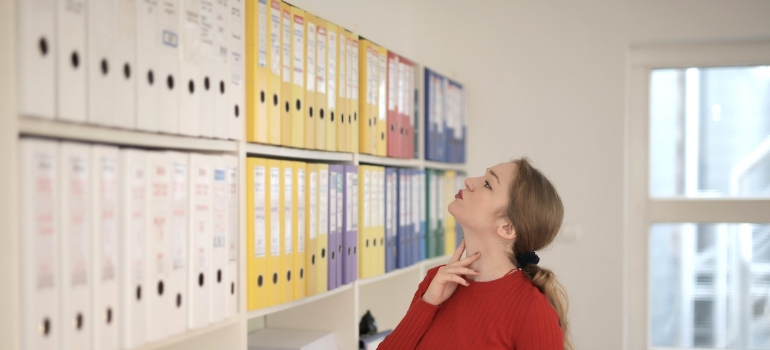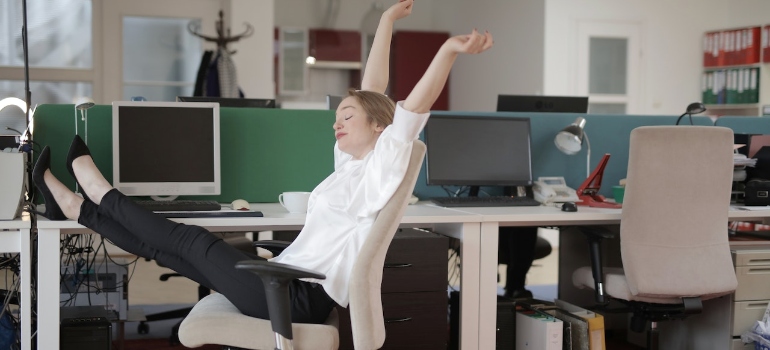Decluttering Your Seattle Office: Best Practices for a More Productive Space
While many of Seattle’s professionals invest in advanced technology or training programs to enhance productivity, the solution might be simpler: the state of your workspace. A disorganized office often translates to wasted time, unnecessary stress, and reduced output. Hence, the importance of an organized workspace goes beyond mere aesthetics; it plays a crucial role in how effectively we work. This article sheds light on the profound effects of decluttering your Seattle office on productivity and offers a comprehensive roadmap to optimize your workspace for peak performance. Ready to optimize your space with the help of movers and packers Seattle business owners rely on? Let’s get started.
Understanding the Impact of Clutter
When we think of clutter, we often picture stacks of paper, overflowing trash cans, and disordered desks. However, its implications stretch far beyond a simple, messy appearance. Clutter can:
- Overwhelm our cognitive processes, leading to decreased motivation and focus.
- Pose physical risks, including tripping hazards and potential injuries.
- Create economic inefficiencies, resulting in lost hours and missed business opportunities.
This is why maintaining a clutter-free environment is not just about aesthetics but fundamentally about ensuring optimal mental well-being, physical safety, and business productivity. Moreover, engaging with experienced office movers in Seattle can provide insights into efficient space utilization based on their extensive experience.

Mental and Emotional Effects
Clutter can create a significant cognitive load. Constant visual reminders of disorganization can lead to distractions, stress, and a decrease in motivation. Think of each misplaced item or stack of papers as a task that’s yet to be completed. This creates a persistent feeling of being overwhelmed, which can hinder creativity and focus. This is especially vital for business owners and employees in dynamic cities like Seattle, where the pace of business is rapid.
Physical Implications of Decluttering Your Seattle Office
Time is money. Business owners in Seattle can’t afford to waste precious minutes (or hours) searching for a crucial document or a misplaced piece of equipment. Besides the lost time, cluttered spaces can pose potential safety hazards. Tripping over loose cords or knocking over precarious stacks can lead to injuries and downtime, affecting both morale and the bottom line.
Economic Consequences
Reduced efficiency equates to economic losses. When tasks take longer due to disorganization, it results in extended work hours, missed opportunities, and sometimes even the loss of potential clients or customers. For Seattle-based businesses, staying competitive means operating at peak efficiency, and clutter can be a direct roadblock to that goal.
Decluttering Step by Step
To effectively declutter, you must work on it systematically, starting with an initial assessment, progressing to sorting and categorizing, followed by decisive purging, and culminating in organized placement and storage of retained items.

Begin by critically assessing your current office layout, ensuring that your furniture is arranged for optimal movement. Ask yourself if there are designated spaces for essential items or if they are dispersed haphazardly. Moving on to the core of decluttering, it’s essential to effectively categorize items into three distinct groups: essential, occasionally used, and unnecessary. With this categorization in place, it becomes straightforward to decisively act on which items to keep, recycle, donate, or discard.
Address digital clutter, too; an overflowing email inbox or redundant files can be as stifling as physical clutter. When it comes to those seldom-used but necessary items, consider Seattle storage options to maintain a clutter-free space. With purged items out of the way, assign specific places for the remaining items. Use organizational tools suitable for your needs, be it shelves, filing systems, or digital management software.
Creating a Habit of Decluttering Your Seattle Office
Consistency is key. It’s not enough to declutter once; maintaining a streamlined workspace requires continuous effort.
Setting Regular Decluttering Intervals
Depending on the nature of your business, establish a routine. For some, a daily tidy-up might be necessary, while others might benefit from weekly or monthly decluttering sessions. For instance, those in the tech sector, where rapid developments and iterations occur, may find that a daily tidy-up aligns with their pace, ensuring that old prototypes or outdated paperwork are promptly cleared.

On the other hand, businesses like local bookstores or craft shops, with more static inventories, might benefit from weekly or monthly decluttering sessions. And while you sort, utilize the moving boxes Seattle offers, renowned for their resilience, ensuring your items remain safe during this transitional period.
Cultivating Mindfulness in Office Habits and Purchases
In today’s fast-paced business environment, the temptation to acquire the latest gadgets, tools, or office supplies is ever-present. However, it’s essential to pause and assess the genuine need before making any addition to the workspace. Seattle, being a hub for innovation and entrepreneurship, often exposes businesses to cutting-edge technologies and trends. But embracing mindfulness is about distinguishing between the ‘nice-to-have’ and the ‘must-have.’
For every intended purchase, initiate a brief evaluation process. Consider not only the immediate utility but also the long-term implications. How often will this item be used? Does it replace something that’s still functional? How does it fit into the current office ecosystem? Is there a more sustainable or space-efficient alternative available?
Furthermore, it’s prudent to establish a regular review of office inventory. This can be done quarterly or semi-annually. During these reviews, identify items that have become redundant or are no longer in use. Such exercises not only prevent unnecessary clutter but also help in efficient budgeting by avoiding impulsive or redundant expenditures.
Additionally, cultivate a culture of mindfulness among the team. Encourage employees to voice their opinions before new acquisitions. Often, they provide valuable insights into what’s genuinely needed versus what’s superfluous.
Adopting a mindful approach is only partly about being frugal. It is also about fostering an environment that values intentionality, purpose, and clarity. This mindset ensures that every item in every corner of the office has a purpose.

Implementing the “One in, One Out” Rule
The “one in, one out” rule, as it’s commonly known, is a straightforward strategy that’s rooted in balance and sustainability. Every time a new item is introduced into the office, an old one finds its exit. This approach guarantees the volume of items remains static, preventing gradual buildup over time.
Furthermore, by adhering to this rule, businesses are encouraged to evaluate the lifespan and utility of items regularly. This consistent evaluation ensures that only the most relevant and functional items occupy the workspace, fostering efficiency.
However, there are times when items, although not immediately needed, hold long-term value or sentimental significance. For such items, especially if they’re voluminous, finding appropriate PortaBox storage in Seattle becomes vital. Offering both flexibility and security, on-demand, door-to-door storage ensures that while the office remains clutter-free, essential archives or bulkier materials are just a call away, safely stored, and easily accessible when needed.
Maximizing Productivity Through Design
The design and layout of your office space play pivotal roles in boosting productivity. These components not only affect workflow and communication but also the general well-being and mood of everybody working within the space.
The Role of Ergonomic Furniture
Ergonomics focuses on designing workspaces to best suit the human body, optimizing comfort and minimizing strain or risk of injury. Investing in ergonomic furniture, like chairs that support spinal curves or desks at the correct height, can prevent chronic conditions like back pain or carpal tunnel syndrome. Moreover, comfort leads to prolonged concentration, ensuring tasks get completed more efficiently.
Importance of Natural Light and a Pleasant View
Research consistently underscores the significance of natural light in workplaces. Natural light not only reduces eye strain but also boosts mood and energy levels, leading to increased productivity. Additionally, an office with a pleasant view can provide moments of relaxation during intense work sessions, allowing the mind to reset briefly.

Using Colors and Decor that Inspire Focus and Creativity
Colors evoke emotions. For instance, blue can stimulate the mind, promoting focus, while green can encourage relaxation and balance. Incorporating such colors, either through wall paint or decor, can significantly impact the mindset of employees. Artwork, plants, or other decor elements can further enhance creativity and provide inspiration during brainstorming sessions.
The Value of Having Dedicated Zones
Did you know that, apart from decluttering your Seattle office, structuring office spaces with distinct zones enhances workflow?
- Quiet Zone: Outfitted with individual desks, it’s the go-to area for tasks that demand focus and minimal interruptions.
- Collaborative Spaces: Geared towards teamwork, these areas feature tables, seating, and collaborative tools essential for group brainstorming or discussions.
- Relaxation Corner: More than just a break area, this zone provides employees with a peaceful environment outfitted with comfy seating for short breaks and moments of reprieve.
- Tech Hub: A centralized station equipped with communal devices like printers, scanners, and copiers, ensuring swift access without disruption in primary work zones.
- Kitchenette: A compact area dedicated to refreshments, equipped with basics like a coffee machine, fridge, and microwave, allowing employees to prepare light meals or grab a quick snack.
As you can see, simply by categorizing areas based on task-specific needs, you can streamline operations, maximize efficiency, and foster both individual and collective productivity!
Digital Decluttering for Modern Offices
In today’s age, physical clutter is just one side of the coin. Digital clutter can be equally, if not more, stifling, especially given our increasing reliance on technology for most tasks. When decluttering your online space, it’s vital not to overlook the offline aspect of your office. Ensuring a smooth transition of your office inventory to or from storage is crucial. A reliable local moving company Washington State offers can assist in this process, providing the expertise needed for a seamless transition.

Organizing Digital Files and Using Cloud Storage Solutions
Just as you’d categorize physical documents while decluttering your Seattle office, it’s equally important to sort digital files meticulously:
- Adopt clear naming conventions that reflect the file’s content or purpose.
- Create a hierarchical folder structure to group related files together, making them easier to locate.
- Implement tags, especially for shared documents, as they can expedite the search process.
- Regularly archive or delete outdated files to maintain a streamlined digital workspace.
As for cloud storage solutions, they do more than just provide a backup. They offer easy access from different devices and locations, ensuring work continuity even outside the office. Additionally, many cloud platforms feature collaboration tools, allowing multiple team members to work on a document simultaneously, enhancing team efficiency and communication.
Unsubscribing from Unnecessary Email Lists and Notifications
A cluttered email inbox doesn’t just affect aesthetics; it can significantly hamper your efficiency. Overcrowded inboxes can cause vital emails to be overlooked, potentially leading to missed business opportunities, deadlines, or miscommunication with clients or colleagues.
Additionally, constant notifications from non-essential subscriptions can be distracting, disrupting your workflow throughout the day. So, make it a routine to periodically sift through your subscriptions, unsubscribing from newsletters, promotional offers, or updates that no longer serve your professional needs. This practice ensures that only relevant, crucial emails capture your attention.
Using Productivity Apps to Streamline Tasks and Reminders
Harness the power of productivity apps to keep track of tasks, set reminders, or collaborate with team members. Tools like task managers and digital calendars, or collaboration platforms can drastically reduce digital noise, ensuring you remain focused on priorities.
Get the Best of a Clutter-Free Seattle Workspace
As every successful business person can testify, a clutter-free office is a productivity-rich environment. Hence, you should understand the profound impact of both physical and digital clutter on work performance, implement systematic decluttering practices, and create spaces that foster innovation, efficiency, and growth. So, if you encourage consistent maintenance and cultivate mindfulness in your daily habits by decluttering your Seattle office, you will ensure lasting productivity benefits. It is bound to position your businesses for continued success in the competitive Seattle marketplace.
Why Choose Us
History
Hansen Bros. Moving & Storage is locally owned and operated by the same family for four generations, since 1890. We have a well-established reputation for service quality and reliability with a high percentage of repeat household and commercial clients.
Professionalism
We’re a certified ProMover by the American Moving and Storage Association with A+ rating with the Better Business Bureau, voted “Best in Western Washington” in 2009 and from 2011 to 2016 by KING5. Our company is fully licensed and insured and member of WMC and AMSA.
Value
Hansen Bros. Moving & Storage provide free, no-obligation in-home estimate and competitive rates, including low minimum rates for shipments moving under 300 miles. We’ve set a refund policy for unused packing materials and three Puget Sound locations to help clients save on travel fee costs.



